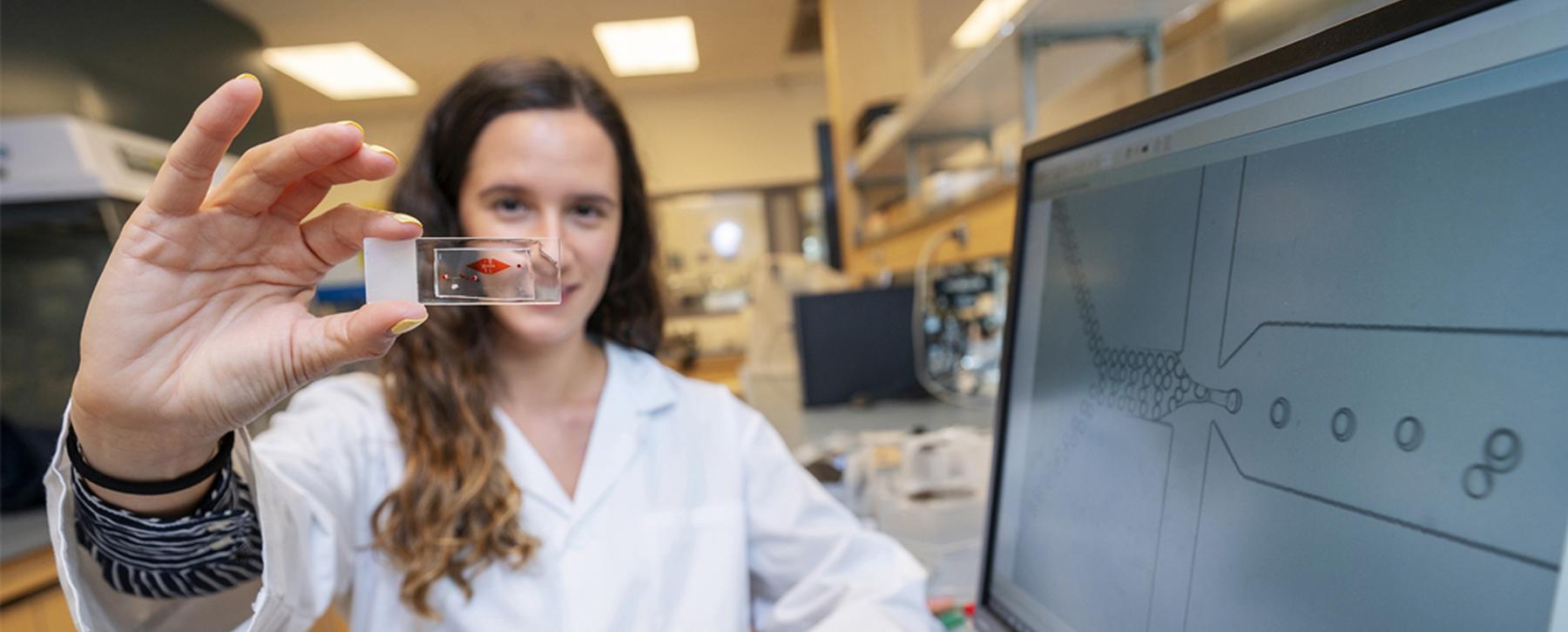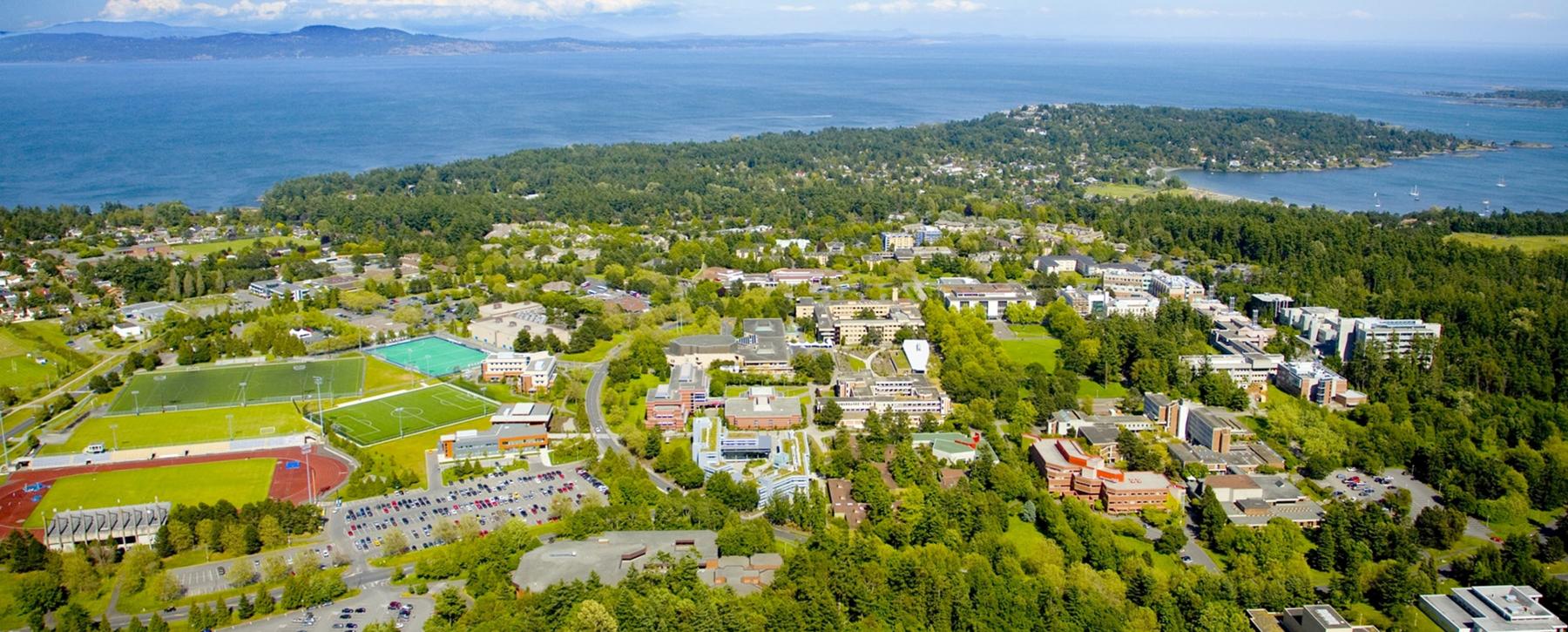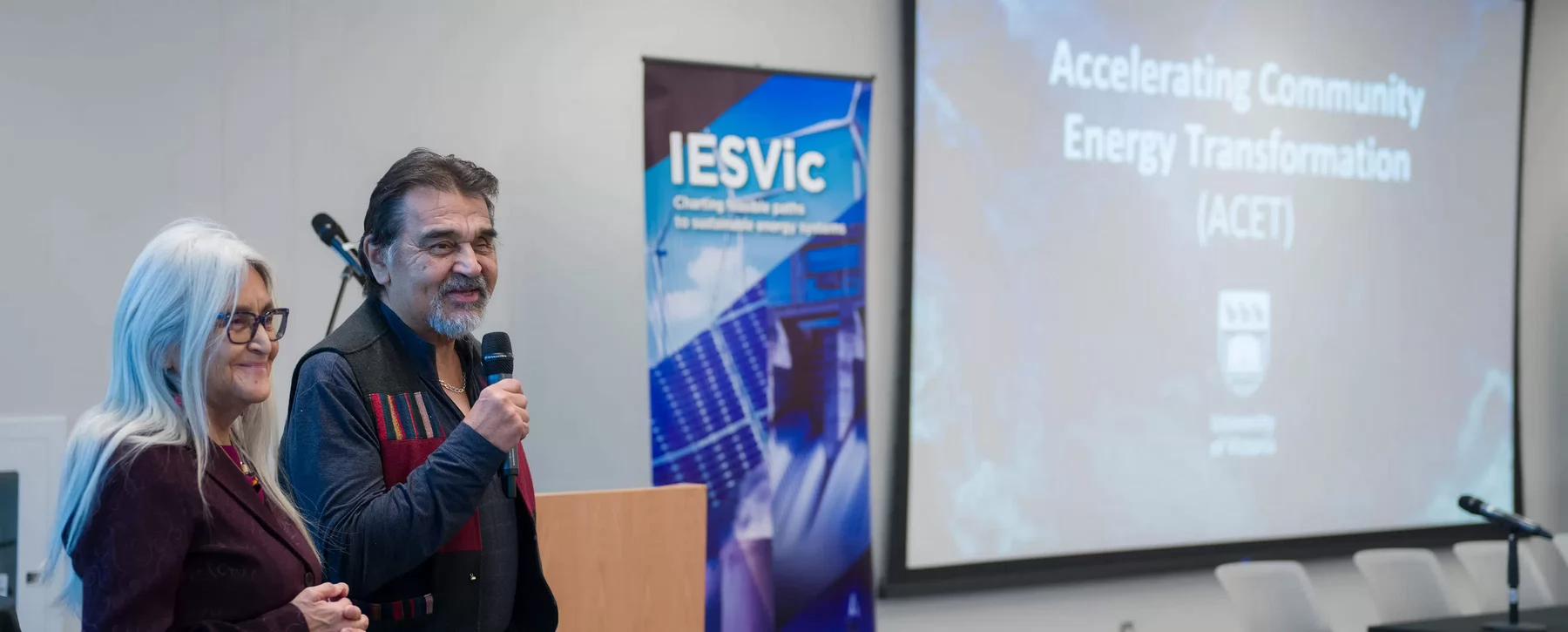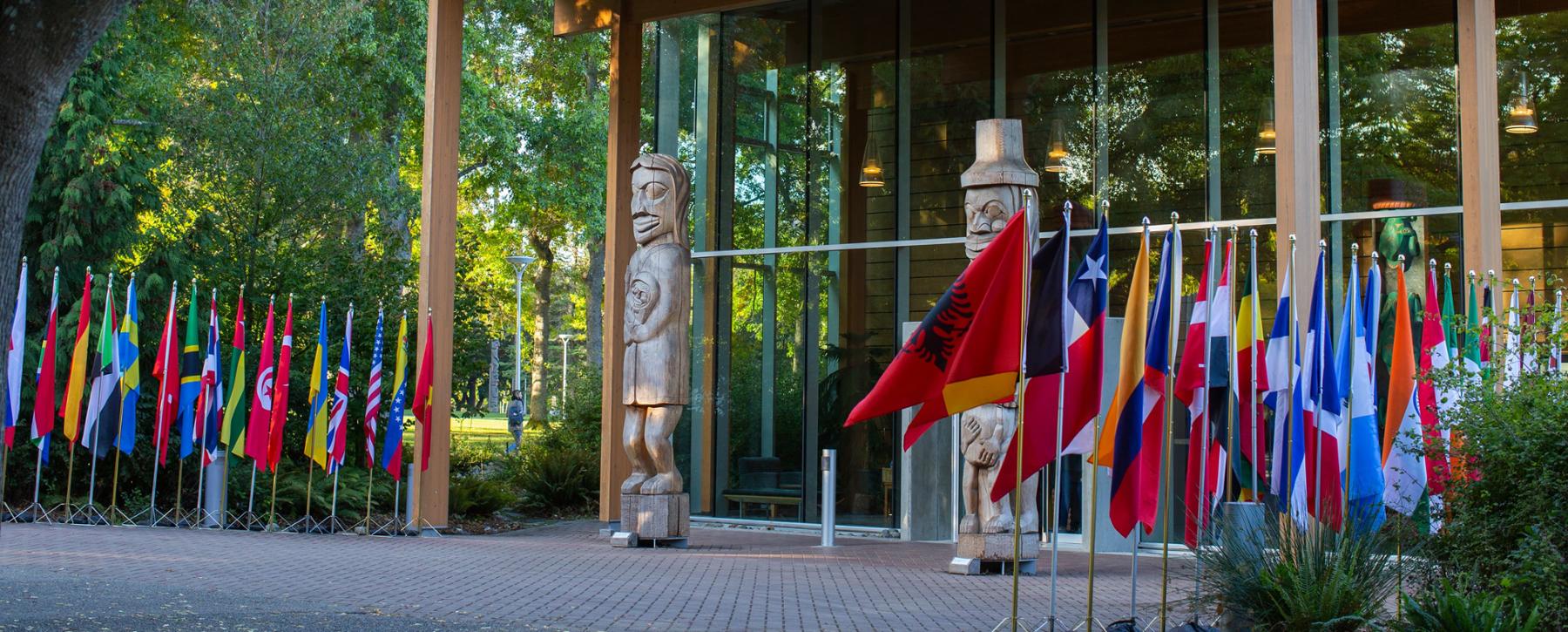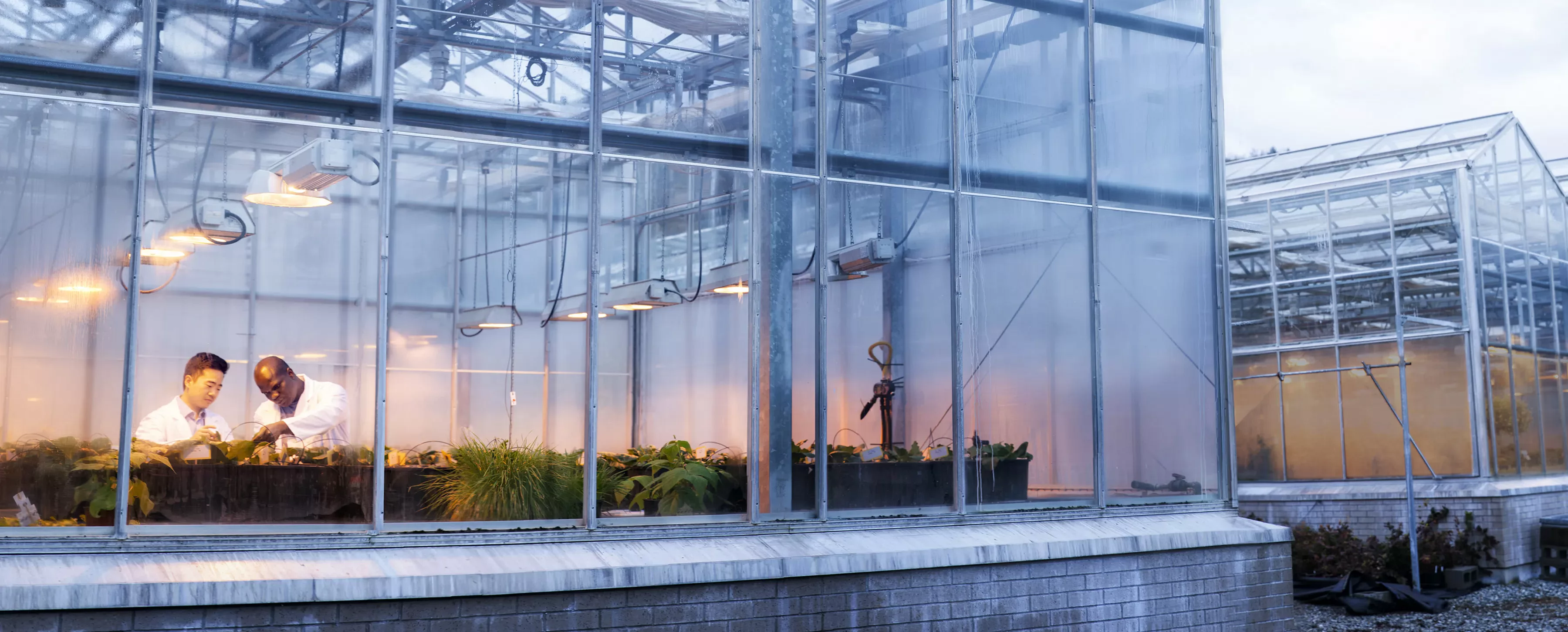Aspiration 2030
Creating a better world through curiosity, engagement & innovation
At UVic, we’re driven by our curiosity, engagement and innovative spirit to help solve the world’s biggest problems. As we list what we aspire to be and to do by 2030, we know that we are already well on our way. We’re guided by our principles, our extraordinary natural and cultural environment and our deep respect for the learning that has come before.
Our sense of place
čəŋiɫč | ĆEṈ¸IȽĆ is the native oak tree that for many millennia has thrived in the specific environment of this place. These beautiful, sturdy trees produce canopies of dark green leaves, flowers that ripen into acorns, and ecosystems that support hundreds of species of plants, insects and animals. For millennia qʷɫaʔəl | ḰȽO¸EL, the camas plants that carpet ĆEṈ¸IȽĆ meadows, have grown from deep in the soil, providing visual beauty, food for humans and other creatures, and cultural and economic value. There are ancient knowledges here, and wisdom, alongside an energizing search for new ways of understanding the world and our place in it.
Whether our ancestors have lived on these lands for millennia or we arrived here last month, at the University of Victoria all things are connected through our guiding principles of academic freedom, ambition, collaboration, courage, excellence, inclusion and respect, transparency, and truth and reconciliation. The nature and culture of this place have given us unique strengths as individuals and collectively in our fields of inquiry, exploration and creation to work with people here and around the globe as we address pressing challenges.
Given the importance of ĆEṈ¸IȽĆ within this place, it is also a meaningful metaphor for Aspiration 2030. This is depicted in the beautiful visual created by Carey Newman Hayalthkin’geme (Kwakwaka’wakw/Coast Salish), where the roots of the tree represent our history and evolution, ever expanding; the trunk represents the energy, activity and structures that enable our research and creative works; and the foliage represents the impact of our work on the world, with each major branch reflecting one of our five impact areas and each leaf within the five main branches acknowledging the past, present and future of work in these areas. The roots, trunk and foliage are intertwined, each dependent on the others for growth and sustenance.
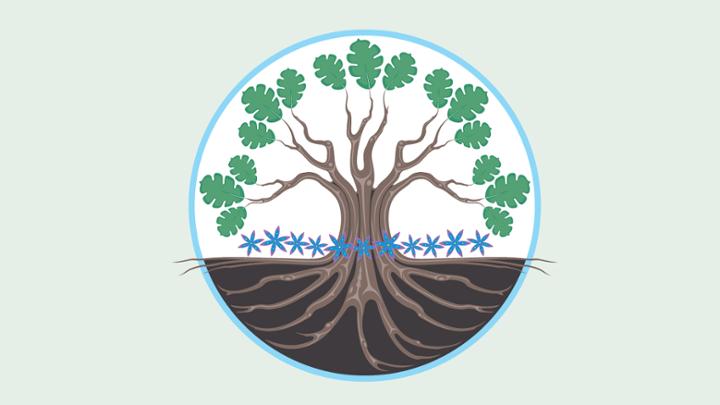
k̓ułas/qʷɫaʔəl
k̓ułas is the Kwak’wala word for Garry Oak and qʷɫaʔəl is the lək̓ʷəŋən word for camas
This design is meant to connect us to the traditional territories upon which we live and encourage us to make sure that our work in the present honours the past and respects the future.
Carey Newman Hayalthkin’geme, Artist & UVic Impact Chair in Indigenous Art Practices, August 2021
Impact areas
At the University of Victoria, we recognize that the world is changing rapidly. As a global society, we are facing enormous challenges and will need novel solutions to ensure our survival. Our researchers are up to the task.
Building on the UN Sustainable Development Goals (UN SDGs), it is our intention to create a better world through transformative research and our curiosity, engagement and innovation.
We have identified five overlapping impact areas where we are uniquely positioned to make a difference:
- Climate, environmental change and sustainability
- Health and wellness
- Indigenous-led scholarship
- Social justice and equity
- Technology and the human experience
Learn more about our research impact areas.
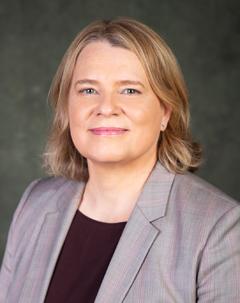
Our commitment to fundamental research, inquiry and theoretical perspectives remains unflagging. We will continue to support and nurture excellence in these areas because we know that curiosity-driven research and creativity are the essential building blocks for tomorrow’s life-changing applications.
Our aspirations
Our Research and Creative Works Strategy is built on five aspirations:
- Research environment
- Research community
- Commitment to Indigenous scholarship
- Global engagement
- Societal impact
These define where we want to be by 2030, achieving within each aspiration five bold outcomes through ten key actions.
-
Our research revenues exceed $200M per year
-
We capitalize on opportunities to advance our research and creative work and lead national and international initiatives
-
Interdisciplinary collaborations enrich our research ecosystem and are encouraged and supported
-
We have developed world-class research facilities and studio spaces, including spaces that welcome community and industry partners
-
We have an efficient system of institutes, centres and clusters to support and promote research collaborations and connections
-
Invest strategically to support research excellence, incentivize interdisciplinary collaboration and raise the profile of our impact areas
-
Increase research infrastructure and develop modern new research and creative spaces on campus
-
Reduce research-related administrative load by digitizing and streamlining internal processes
-
Create an Audacity Grants program to support bold new ideas
-
Create a new model of support and accountability for institutional research centres and entities
-
Restructure the internal grants portfolio to optimally address researchers’ needs with a flexible suite of opportunities delivered annually
-
Provide internal matching funds as leverage for major external funding opportunities
-
Make investments to support the research recommendations from related institutional plans
-
Support the development of faculty-specific strategic research plans
-
Increase capacity in research services to provide more pre- and post-award support
Priority Action: Invest strategically to support research excellence, incentivize interdisciplinary collaboration and raise the profile of our impact areas
- Received $84M Canada First Research Excellence Fund award for Accelerating Community Energy Transformation (ACET)
- Received $8M Canada Excellence Research Chair in Decolonial and Transformational Indigenous Art Practices
- Received a $1.65M NSERC CREATE grant to launch a new Coastal Climate Solutions Leaders graduate training program
Priority Action: Increase research infrastructure and develop modern new research and creative spaces on campus
- Expanded Health Core Facility with four bookable research spaces, including a new human bio-specimen collection facility and flagship 1,400 sq-ft lab
- Received a $1.25M CFI Innovation Fund grant for a new Environmental Simulation Facility for climate impact research on plant health
- Received $16.4M to fully upgrade UVic’s Arbutus Cloud national high-performance and cloud computing infrastructure
- Opened new UVic BioInnovation Hub to enhance collaboration in BC’s life sciences sector and support early-stage entrepreneurs
Priority Action: Reduce research-related administrative load by digitizing and streamlining internal processes
- Launched Pivot-RP, a new external funding search tool
- Created new Research Finance ticketing system to more effectively triage incoming requests from researchers, distribute administrative workload and improve response times
Priority Action: Provide internal matching funds as leverage for major external opportunities
- Internal match fund application process
- Received a $2.5M SSHRC Partnership Grant to advance a sustainability framework for economic development in Indigenous communities

Exploring how plants respond to climate extremes

$83.6M advances UVic-led vision for clean energy shift
The University of Victoria will lead a national, multi-partner research initiative that will help get Canada to net zero—one community at a time.

Elevating cloud computing performance and energy efficiency
Deployed and operated by the Research Computing Services team at the University of Victoria, Arbutus Cloud has revolutionized how scientists process, share and store massive data sets.
-
We attract top talent from around the world
-
We have a culture of recognizing and celebrating our researchers and research excellence in all of its forms
-
We invest in graduate students, post-doctoral fellows and early career researchers to build the capacity of the next generation
-
We are a welcoming, convening space where researchers of diverse identities, experiences and ideas can thrive
-
Our students have ample opportunities for meaningful research experiences
-
Create dedicated support programs for early career researchers, post-doctoral fellows and individuals from equity-deserving groups
-
Increase support for graduate students and the number of graduate students in alignment with the Strategic Enrolment Management plan
-
Promote research excellence as an important consideration for all faculty hires
-
Embed equity, diversity and inclusion (EDI) in research processes and activities to overcome systemic barriers and build and support a diverse research community
-
Allocate Canada Research Chairs and other institutional chairs according to strategic priorities and pursue cluster hires when possible to build capacity in strategic areas
-
Create stronger linkages between researchers and UVic research entities
-
Enhance protected time for faculty who attract major grants
-
Enhance research-inspired learning for undergraduate students and create more research opportunities beginning in first year
-
Identify ways to recognize and reward a broader array of research impacts that go beyond traditional metrics
-
Organize campus events so UVic researchers can network and learn more about the research conducted across campus
Priority Action: Create dedicated support programs for early career researchers, postdoctoral fellows, and individuals from equity-deserving groups
- Created new REACH Early Career Award for Excellence in Research
- Revised university policy to give postdoctoral fellows employee status with benefits eligibility
- Launched new Aspiration Postdoctoral Fellowships Program and recruited 16 new early-career researchers through first two intakes
Priority Action: Embed equity, diversity and inclusion in research processes and activities to overcome systemic barriers and build and support a diverse research community
- EDI Research Officer facilitated a series of workshops for faculty and organized expert training on gender diversity
- Two OVPRI units participated in UVic Equity Action Plan implementation pilot program
- Supported the development of EDI actions for major strategic initiatives (CFREF/CERC)
Priority Action: Allocate Canada Research Chairs and other institutional chairs according to strategic priorities and pursue cluster hires when possible to build capacity in strategic areas
- Conducted eight successful preferential/limited Canada Research Chair (CRC) searches across different disciplines
- Created three new Impact Chairs in ocean ecosystem change and conservation, transformational governance for planetary health and Indigenous art practices
- Created inaugural Chief Mungo Martin Research Chair in Indigenous Mental Health
Priority Action: Enhance research-inspired learning for undergraduate students and create more research opportunities beginning in first year
- Valerie Kuehne Undergraduate Research Awards were launched to provide first-year undergraduate students with research-enriched and applied experiences in their field of study. Ten of the 50 awards went to individuals who are members of underrepresented groups

Bringing a 16th-century play into the 21st century

Aspiration post-doctoral fellows advance equity
The Aspiration Post-doctoral Fellow program attracts outstanding scholars to conduct cutting-edge research that advances equity, diversity, and inclusion (EDI) principles in UVic's research impact areas.

First-of-its-kind program for climate action leaders
-
We support and provide visibility to Indigenous research and creative endeavours across the university
-
Indigenous research and innovation at UVic honours the lives of people whose land we are on by respecting data sovereignty, mobilizing knowledge and offering solutions to issues that Indigenous Nations, communities, collectives and organizations prioritize
-
Indigenous scholars have frequent opportunities to assess and report on the university’s progress in meeting Indigenous research commitments
-
We have demonstrated our commitment to the principles and values set out in United Nations Declaration on the Rights of Indigenous Peoples (UNDRIP), the Truth and Reconciliation Commission of Canada (TRC) and BC’s Declaration on the Rights of Indigenous Peoples Act
-
Elders, Knowledge Keepers and community researchers are welcomed partners in UVic research
-
Provide research support for Indigenous scholars who are often asked to take on significant service, administrative or community roles
-
Provide dedicated support for Indigenous-led research and creative endeavours
-
Increase funding for the Centre for Indigenous Research and Community-Led Engagement (CIRCLE) to support dedicated staff positions
-
Create Relational Knowledge Grants to facilitate relationship building with Indigenous Nations, communities, collectives and organizations
-
Increase the profile of Indigenous research through new awards and recognitions
-
Develop culturally appropriate research-related resources and spaces and ensure they are widely accessible to Indigenous scholars, students and Nations, communities, collectives and organizations
-
Create and support research mentorship opportunities for Indigenous graduate students and early career researchers
-
Establish an Indigenous Research Advisory Committee to guide the implementation of new supports for Indigenous scholars
-
Ensure the OVPRI leadership team has access to Indigenous expertise to guide decision making and support of Indigenous-led research
-
Create more opportunities for community Elders and Knowledge Keepers to be involved in university research
Priority Action: Increase the profile of Indigenous research through new awards and recognitions
- Created new REACH Indigenous Scholar Award for Excellence in Research
- Funded two new Aspiration Research Clusters in Indigenous Economics and Indigenous Language Revitalization
Priority Action: Increase funding for the Centre for Indigenous Research and Community-Led Engagement (CIRCLE) to support dedicated staff positions
- Funded two new Associate Director positions and provided additional support for equipment, training and resources
Priority Action: Create Relational Knowledge grants to facilitate relationship building with Indigenous Nations, communities, collectives and organizations
- Relational Knowledge grants program created and adjudicated through CIRCLE
- Created an Indigenous Research Advisory Committee

Canada Excellence Research Chair advances reconciliation

REACH Awards' inaugural Indigenous Scholar Award
Christine Welch and Jean-Paul Restoule were celebrated as inaugural recipients of UVic’s ʔəy̓ nəwəl ʔist | ÍY,NEUELIST | Moving forward together for the good of all | Indigenous Scholar Award for Excellence in Research

Indigenous decision making for Indigenous communities
-
Our strong research reputation ensures that we consistently place in the top 250 in global rankings
-
We have thriving research partnerships with top global universities and actively participate in international networks, consortia and associations
-
We are globally recognized for the excellence of our research and our contributions to our impact areas
-
We are a destination of choice for international scholars, conferences, and workshops/schools that tackle global interdisciplinary challenges
-
We engage with alumni and other members of the community to help unlock new research opportunities and partnerships
-
Provide support and set up new infrastructure to attract more international visitors and establish UVic as a hub for workshops, conferences and major events
-
Expand the Building Connections Fund to provide seed funding for international research projects and collaborations
-
Establish a Thinkers-in-Residence program to bring international leaders to UVic for collaboration and open discourse on societal challenges
-
Identify countries, regions, institutions, networks, and businesses of strategic priority for international research collaboration and partnerships
-
Plan and execute international research engagements to develop strategic links and promote UVic research strengths
-
Review and revise policies to facilitate collaboration with international partners
-
Engage with alumni to promote research activities and accomplishments at UVic
-
Increase capacity for research data analytics by fostering greater linkages among relevant units across campus and investing in new databases/tools and staff positions
-
Appoint a pool of Global Research Ambassadors to promote UVic research externally
-
Support the creation of joint graduate programs with international partner universities
Priority Action: Increase capacity for research data analytics by fostering greater linkages among relevant units across campus and investing in new databases/tools and staff positions
- Created new Research Intelligence unit that prepared global rankings submissions and provided expert data analysis to 11 units across campus

Upcycling lives in Brazil and beyond

Decolonizing education in Ghana
Education PhD student Allison Balabuch spent three years developing a school resource about Ghanaian local history and culture for middle school students in the Banda region of Ghana.

Climate solutions from the Amazon to the Arctic
From helping to convert seaweed overgrowth into benefits for the blue economy, to improving travel across sea ice, UVic scholars are working with international teams to advance climate solutions.
-
We are ranked in the global top 50 in the Times Higher Education (THE) Impact Rankings
-
The impact of our work attracts 50% or more of our research revenues from industry, community and donors
-
We collaborate externally to influence the way people feel about the world, improve the resilience and health of our communities, inform policy makers and train the next generation to positively impact society
-
We have established a vibrant regional ecosystem to support innovators and entrepreneurs
-
We have developed deep, mutually respectful and long-lasting collaborations with community groups, local municipalities, government and the private sector to maximize the impact of our research
-
Support research activities that directly advance the UN Sustainable Development Goals (UN SDGs) and systematically track our progress
-
Support the mobilization of knowledge that has strong potential to benefit society
-
Create new research institutes and clusters to enable research progress on pressing societal issues
-
Integrate research opportunities for students and faculty into the activities of the UVic United Nations CIFAL (International Training Centre for Authorities and Leaders)
-
Develop strong relationships with donors, industry and community organizations to diversify revenue streams for research
-
Create an Innovation Network with hubs across Vancouver Island to enhance community outreach and provide new programming to support entrepreneurship and social and economic development
-
Work closely with local, provincial and federal governments to tap into new programs and advance common goals
-
Increase our capacity to communicate research successes and strengths in real time to broad audiences
-
Organize more networking events with industry and community partners to facilitate community engagement and create new linkages
-
Support initiatives in cultural literacy to promote understanding of societal trends and challenges
Priority Action: Increase our capacity to communicate research successes and strengths in real time to broad audiences
- Created a new Research Profile team to help build UVic’s research reputation and increase awareness and impact of core strengths
- Showcased research strengths at Canadian Science Policy Conference in Ottawa
- Hosted high-profile campus visits from federal funding organizations (SSHRC, NSERC, CFI, PacifiCan)
- Made 12 major research announcements, including a record number of Royal Society of Canada Fellows and College members
Priority Action: Create new research institutes and clusters to enable research progress on pressing societal issues
- Launched Aspiration Research Cluster Program and funded nine interdisciplinary research groups in first two rounds of competition
Priority Action: Support research activities that directly advance the UN SDGs and systematically track our progress
- Placed in the top ten globally for climate impact and sustainable cities and communities with an overall ranking of 9th in the world (2023)
- Research Profile team wrote 24 research impact stories and identified 50 others in the media to support the THE Impact Rankings submission
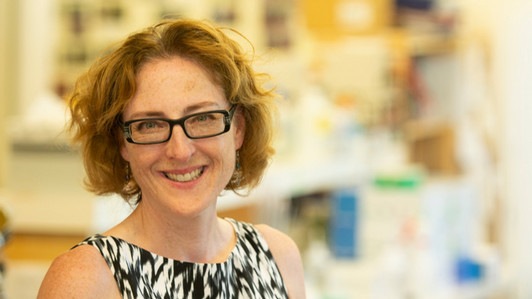
A vaccine for an ancient, all-too-current disease

UVic researchers are active at Science Meets Parliament
UVic delegates attend—and help organize—Science Meets Parliament in Ottawa and B.C. The events forge understandings and connections between researchers and policy makers.

Innovative podcast explores purposeful dinner dialogues
Reporting on our progress
The aspirations and outcomes of this strategy align with the university’s various institutional plans and strategies and will involve all institutional leaders to ensure integration and impact. We create biennial action plans highlighting our priorities for the next two years. Then, like the rings of a tree, we report on our progress each year to build momentum and guide us forward.

Our biennial action plans will guide the implementation of this strategy and yearly progress reports will create momentum and ensure that we stay on track to achieving our aspirations.
Annual reporting
Building a Foundation
2022/23 Annual Report
During this period, we laid the groundwork for a sustained increase in UVic's research capacity. Based on in-depth consultations and careful assessment, the priority in the early years of Aspiration 2030 was putting in place the systems needed to accelerate progress. This included creating new internal funding and support programs and changes to existing services to improve efficiency. It also included identifying our weaknesses and how we can strategically advance our priorities across all of our Aspirations and Impact Areas. See our achievements under the Aspirations above.
university in the world for climate action
2024 THE Impact Rankingsin research funding
2023/2024Aspiration Post-doctoral Fellowships
Aspiration Research Clusters
Biennial action plan
Building Momentum: Priorities for 2024 & 2025
VPRI will continue and expand on the work that began in the preceding years. Ongoing investments in existing and new programs, such as the Aspiration Research Clusters, will lay the foundation for future growth. We aim to accelerate the pace of our achievements, capitalizing on advances and developments made in the first two years of implementing Aspiration 2030. Building a solid foundation of key support programs and strategic initiatives during this period is critical to realizing our aspirations.
Priority Actions and Planned Initiatives for 2024/25
Priority Action: Invest strategically to support research excellence, incentivize interdisciplinary collaboration and raise the profile of our impact areas
- Maintain Aspiration Research Clusters and Matching Funds program
- Attract new research partnerships
- Expand interdisciplinarity as a criterion for internal OVPRI programs
Priority Action: Increase research infrastructure and develop modern new research and creative spaces on campus
- Open collaborative new research space for the Accelerating Community Energy Transformation initiative
- Identify strategic projects for the next CFI Innovation Fund competition
- Engage donors to support the development of new health research spaces
Priority Action: Create a new model of support and accountability for institutional research centres and entities
- Revise university policy on Research Centres and develop a new model of accountability and financial sustainability
Priority Action: Restructure the internal grants portfolio to optimally address researchers’ needs with a flexible suite of opportunities delivered annually
- Conduct a review of all internal VPRI funding programs
Priority Action: Increase capacity in research services to provide more pre- and post-award support
- Recruit a new Director, Research Services
- Support and expand the research grants team
- Optimize Research Finance processes
Priority Action: Create dedicated support programs for early-career researchers, postdoctoral fellows and individuals from equity-deserving groups
- Create a stronger internal community for postdoctoral fellows
- Work with the Faculty of Graduate Studies to create a professional development program for postdoctoral fellows and graduate students
- Provide capacity-building workshops for early-career researchers
Priority Action: Embed equity, diversity and inclusion (EDI) in research processes and activities to overcome systemic barriers and build and support a diverse research community
- Embed EDI, Declaration on Research Assessment (DORA), interdisciplinarity, and early-career research support in all internal OVPRI programs
- Implement Equity Action Plan, provide EDI support for researchers
Priority Action: Identify ways to recognize and reward a broader array of research impacts that go beyond traditional metrics
- Create a working group to develop metrics, tools and processes to recognize a broad array of research impacts
- Expand research recognition program and host an annual celebration of research excellence in all its forms
Priority Action: Provide dedicated support for Indigenous-led research and creative endeavours
- Engage with and empower the Indigenous Research Advisory Committee
Priority Action: Increase funding for the Centre for Indigenous Research and Community-Led Engagement (CIRCLE) to support dedicated staff positions
- Identify a sustainable funding model and organizational structure for CIRCLE
Priority Action: Ensure the OVPRI leadership team has access to Indigenous expertise to guide decision making and support of Indigenous-led research
- Identify opportunities and strategies for supporting Indigenous research, based on the external review and faculty consultation process
Priority Action: Identify countries, regions, institutions, networks and businesses of strategic priority for international research collaboration and partnerships
- Coordinate global outreach in alignment with the President’s Office and the Office of Global Engagement
- Create an International Research Circle to work with and advise VPRI on opportunities for international research collaborations and linkages
Priority Action: Plan and execute international research engagements to develop strategic links and promote UVic research strengths
- Create an International Research Advisory Committee to work with and advise VPRI on opportunities for international research collaborations and linkages
- Vice-President Research and Innovation to proactively plan international engagements that build and strengthen UVic's international research collaborations
Priority Action: Appoint a pool of Global Research Ambassadors to promote UVic research externally
- Global research ambassadors will serve on the International Research Circle and represent UVic when they travel internationally
Priority Action: Support research activities that directly advance the UN SDGs and systematically track our progress
- Continue work to support and track research related to the SDGs and improve our THE Impact Rankings submission
Priority Action: Support the mobilization of knowledge that has strong potential to benefit society
- Identify opportunities to showcase research centres and institutes
- Host training and capacity-building workshops
Priority Action: Create new research institutes and clusters to enable research progress on pressing societal issues
- Complete hiring of core team for the Accelerating Community Energy Transformation (ACET) initiative
- Support Aspiration Research Clusters
- Create new Health Futures Research Institute
- Recruit a new Strategic Climate Advisor
Priority Action: Develop strong relationships with donors, industry and community organizations to diversify revenue streams for research
- Recruit a new Senior Development Officer, Health Research
- Develop business cases for UVic’s comprehensive donor campaign

